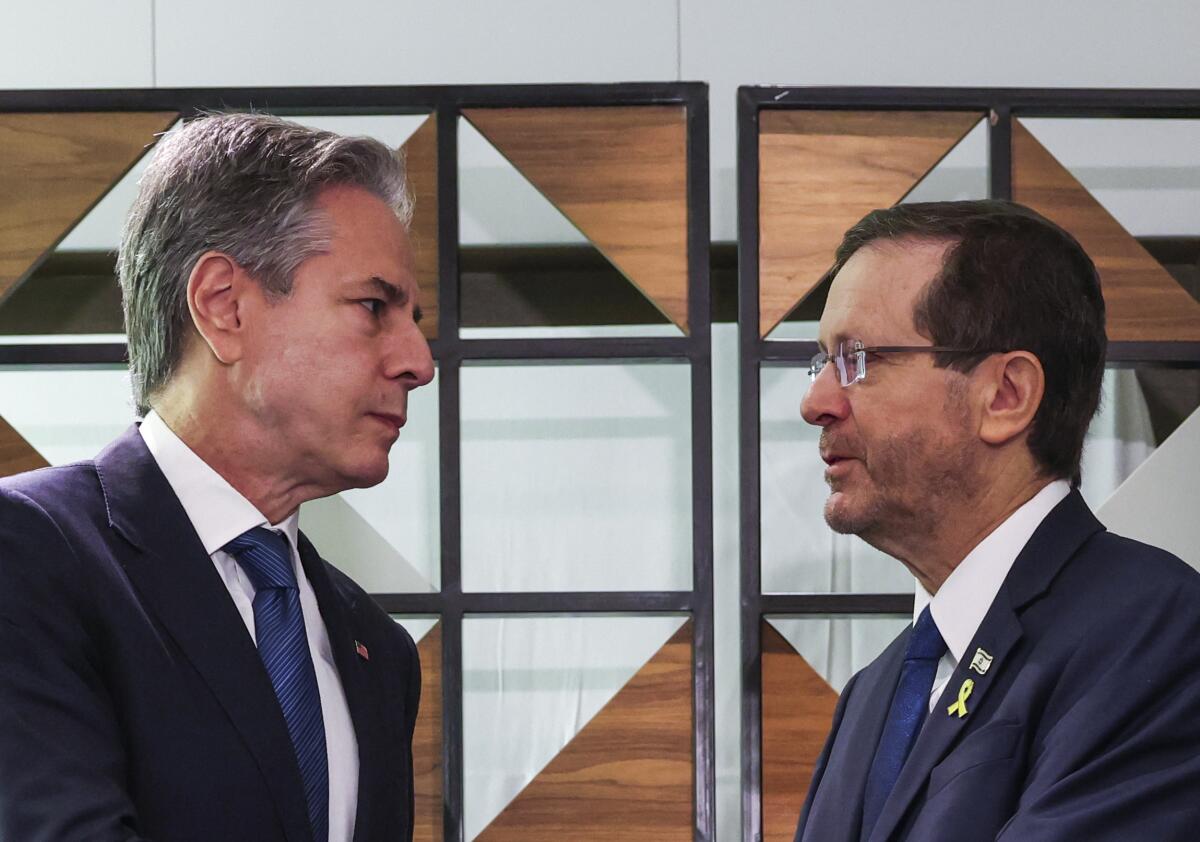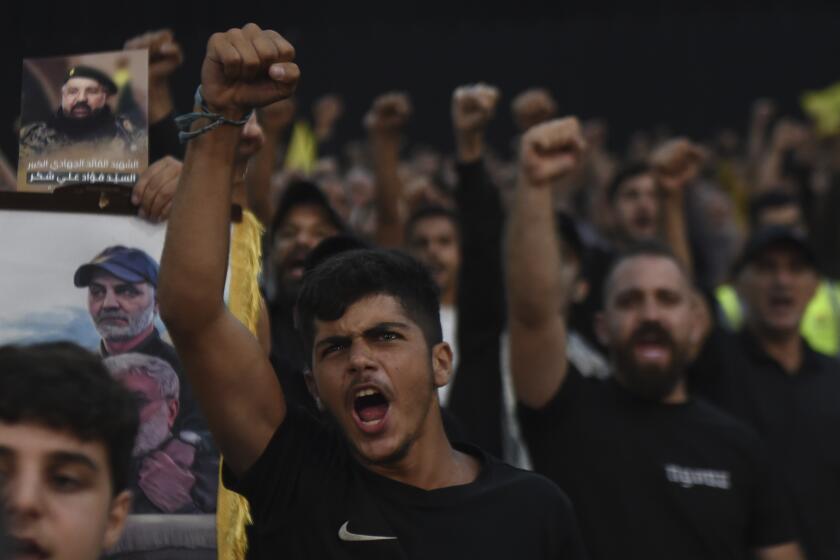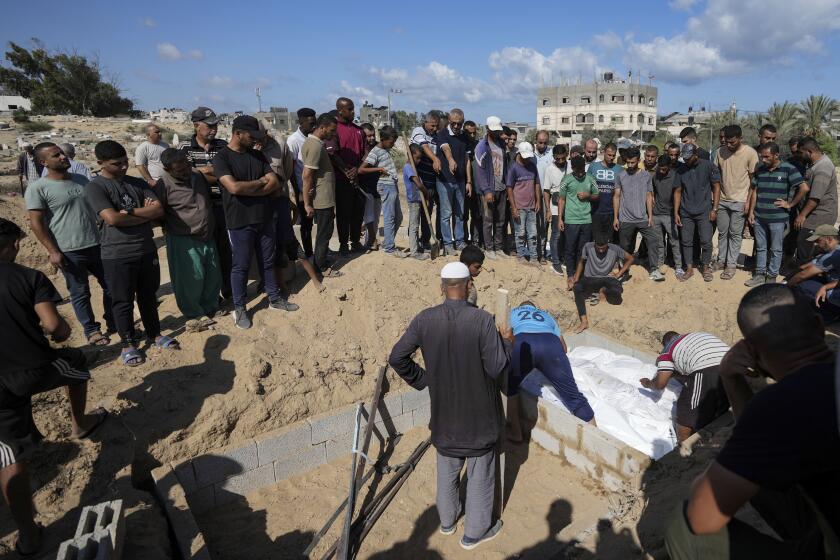Blinken says Israel agrees to U.S.-backed cease-fire proposal and calls on Hamas to do same

- Share via
TEL AVIV — Secretary of State Antony J. Blinken said Monday that Israel has accepted a proposal to bridge differences holding up a cease-fire and hostage release in Gaza, and he called on Hamas to do the same, without saying whether concerns cited by the militant group had been addressed.
The high-stakes negotiations have gained urgency in recent days as diplomats hope an agreement will deter Iran and Lebanon’s Hezbollah from avenging the targeted killings of two top militants that were blamed on Israel. The escalating tensions have raised fears of an even more destructive regional war.
Blinken spoke after holding a 2½-hour meeting with Israeli Prime Minister Benjamin Netanyahu earlier in the day, and will travel to Egypt and Qatar for further negotiations. The three mediating countries have spent months trying to end the war in Gaza, with the talks repeatedly stalling.
“In a very constructive meeting with Prime Minister Netanyahu today, he confirmed to me that Israel supports the bridging proposal,” Blinken told reporters, without saying what the proposal entails. “The next important step is for Hamas to say ‘yes.’”
He added, however, that even if Hamas accepts the proposal, negotiators will spend the coming days working on “clear understandings on implementing the agreement.” He said there are still “complex issues” requiring “hard decisions by the leaders,” without offering specifics.
Israel’s assassinations of Hezbollah commanders have short-term benefits. But longer-term strategic victory is less certain.
Hamas has said it is losing faith in the U.S. as a mediator, accusing American negotiators of siding with Israel as it makes new demands that the militant group rejects. Blinken did not say whether the proposal addressed Israel’s demand for control over two strategic corridors inside Gaza — which Hamas has said is a nonstarter — or other issues that have long bedeviled the negotiations.
Netanyahu said that he had a “good and important meeting” with Blinken and appreciated the “understanding that the United States has shown to our vital security interests, along with our shared efforts to release our hostages.” He added that efforts are being made to release the maximum number of hostages in the first stage of a cease-fire deal.
Mohammad Abu Al-Qumsan lost his children, wife, and mother-in-law in an Israeli strike that hit a Gaza Strip apartment building while he was away.
Blinken’s ninth mission to the Middle East since the conflict began came days after mediators, including the United States, expressed renewed optimism that a deal was near. But Hamas has expressed deep dissatisfaction with the latest proposal, and Israel has said there were points on which it was unwilling to compromise.
Earlier on Monday, Blinken said it was a “decisive moment,” and “maybe the last” opportunity to free the hostages and secure a cease-fire.
“It’s also time to make sure that no one takes any steps that could derail this process,” he said in a veiled reference to Iran. “And so we’re working to make sure that there is no escalation, that there are no provocations, that there are no actions that in any way move us away from getting this deal over the line, or for that matter, escalating the conflict to other places and to greater intensity.”
Mediators will meet again this week to try to cement a cease-fire. Blinken will travel Tuesday to Egypt and Qatar, where Hamas maintains a political office.
The war began Oct. 7 when thousands of Hamas-led militants stormed into Israel, killing around 1,200 people, mostly civilians, and abducting around 250 others. Of those, about 110 are still believed to be in Gaza, though Israeli authorities say around a third are dead. More than 100 hostages were released in November during a weeklong cease-fire.
Dozens of Israelis demonstrated outside of the Tel Aviv hotel where Blinken was staying, holding photos of the hostages and demanding an immediate cease-fire.
“We know that only with vast help of the American administration a deal will come,” said Yehuda Cohen, whose 20-year-old son, Nimrod, is being held hostage in Gaza. “We are here to say it out loud: Blinken, Antony Blinken, please push Netanyahu for a deal at any price because I want my son to be free.”
Israel’s counterattack in Gaza has killed more than 40,000 Palestinians, according to local health authorities, and devastated much of the territory. The war has plunged the territory of 2.3 million people into a humanitarian catastrophe, with aid groups now fearing an outbreak of polio.
With the death toll in Gaza over 40,000 after 10 months of the Israel-Hamas war, the small, densely packed Palestinian territory is crammed with bodies.
Blinken said the United States shares those concerns and is working on a plan with Israel to ensure vaccines are made available “in the coming weeks,” saying “it is urgent, it is vital.”
Late last week, the three countries mediating the proposed cease-fire reported progress on a three-phase deal under which Israel would halt most military operations in Gaza and release a number of Palestinian prisoners in exchange for the release of hostages.
Hamas accuses Israel of adding new demands. Israel says it needs a military presence along the Gaza-Egypt border to prevent arms smuggling and along a line bisecting the territory so it can search Palestinians returning to their homes in the north to prevent militants from slipping in. Israel said those weren’t new demands, but clarifications of a previous proposal.
Late Sunday, Hamas said in a statement that Netanyahu has continued to set obstacles to a deal by demanding new conditions, accusing him of wanting to prolong the war. It said the mediators’ latest offer was a capitulation to Israel.
“The new proposal responds to Netanyahu’s conditions,” Hamas said.
Also on Monday, Hamas and another Palestinian militant group claimed responsibility for what appeared to be a failed bombing attack in the Israeli city of Tel Aviv that killed the attacker and wounded a bystander late Sunday.
The bomb appeared to have gone off before it was intended, and it was unclear whether the attacker planned to carry out a suicide blast or plant the explosives and set them off remotely.
Tel Aviv’s district police commander, Deputy Commissioner Peretz Amar, told reporters the blast occurred a few yards from a synagogue filled with people at evening prayers. The fact that the bomb appears to have gone off prematurely, outside on the street, helped avert “a very real tragedy.”
Amar said the suspect, who was seen in security video walking down the street wearing a large backpack, was not previously known to police and they are working to identify where he came from and whether he received any additional support. Israeli police and the Shin Bet security agency said in a joint statement the blast was an attack that involved “a powerful explosive.”
In a statement Monday, Hamas said it and the smaller Palestinian Islamic Jihad group were responsible and threatened to continue attacking “as long as the occupation’s massacres, displacement of civilians, and the continuation of the assassination policy continues.”
Palestinian militants carried out scores of suicide bombings in Israel in the 1990s and 2000s, killing hundreds of people in buses, restaurants and other public places, and drawing Israeli retaliatory raids. But Hamas and other groups have mostly abandoned the tactic since then.
Associated Press write Lee reported from Tel Aviv, Lidman from Jerusalem. AP writer Samy Magdy contributed to this report from Cairo.
More to Read
Sign up for Essential California
The most important California stories and recommendations in your inbox every morning.
You may occasionally receive promotional content from the Los Angeles Times.













